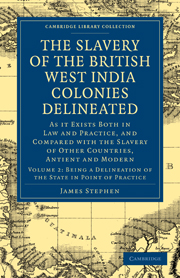 The Slavery of the British West India Colonies Delineated
The Slavery of the British West India Colonies Delineated Book contents
- Frontmatter
- PREFACE
- Contents
- BOOK II DELINEATION OF THE STATE OF SLAVERY IN OUR COLONIES, IN ITS ORDINARY PRACTICAL NATURE AND EFFECTS
- CHAPTER I REASONS FOR RESUMING THIS WORK; DEFENCE OF THE FIRST, AND PLAN OF THE SECOND VOLUME
- CHAPTER II OF AGRICULTURAL LABOUR IN THE TORRID ZONE, AND THE PERNICIOUS EFFECTS OF ITS EXCESS WHEN FORCIBLY EXACTED
- CHAPTER III THE HIGH PROBABILITY THAT THE AMOUNT OF FORCED LABOUR ON SUGAR PLANTATIONS IS OPPRESSIVELY AND DESTRUCTIVELY EXCESSIVE, DEDUCED FROM THE NATURAL TENDENCY OF THE SYSTEM; AND CONFIRMED BY THE DECLINE OF POPULATION AMONG THE PREDIAL SLAVES
- CHAPTER IV THE ACTUAL ORDINARY DETAILS AND GENERAL AMOUNT, IN POINT OF TIME, OF FORCED LABOUR ON SUGAR PLANTATIONS PARTICULARLY STATED AND PROVED; AND THE CRUEL EXCESS DEMONSTRATED
- CHAPTER V THE LABOUR SHEWN TO BE EXCESSIVE ALSO, FOR THE MOST PART, IN POINT OF INTENSITY, OR THE DEGREE OF ACTUAL EXERTION
- CHAPTER VI COMPARISON OF THE AMOUNT OF SLAVE LABOUR ON SUGAR PLANTATIONS WITH THAT OF AGRICULTURAL LABOURERS IN ENGLAND
- CHAPTER VII THE MEANS BY WHICH LABOUR IS ENFORCED ON SUGAR PLANTATIONS GREATLY AGGRAVATES ITS SEVERITY, AND ARE IN THEIR NATURE AND EFFECTS EXTREMELY CRUEL AND PERNICIOUS
- CHAPTER VIII THE MAINTENANCE OF THE PLANTATION SLAVES IS IN A VERY OPPRESSIVE AND CRUEL DEGREE PARSIMONIOUS AND INSUFFICIENT
- CHAPTER IX THE ALLOWANCES OF CLOTHING TO THE FIELD NEGROES BY THEIR OWNERS IS ALSO IN A SHAMEFUL DEGREE PENURIOUS AND INSUFFICIENT
- CHAPTER X THE SLAVES ARE VERY BADLY LODGED
- CHAPTER XI THE SLAVES ARE ALSO TREATED WITH GREAT HARSHNESS, NEGLECT, AND INHUMANITY WHEN SICK
- CHAPTER XII THE WHOLE EXPENSE OF THE MAINTENANCE OF PLANTATION SLAVES ESTIMATED AND COMPARED WITH THE COST OF FREE LABOUR
- CHAPTER XIII CONCLUDING AND PRACTICAL REFLECTIONS
- APPENDIX: CASES OF CRUELTY, INDICATING THE GENERAL PREVALENCE, IN THE SUGAR COLONIES, OF INSENSIBILITY TO THE SUFFERINGS OF SLAVES, AND AN INDISPOSITION TO RESTRAIN OR PUNISH THE AUTHORS OF SUCH OFFENCES
CHAPTER IV - THE ACTUAL ORDINARY DETAILS AND GENERAL AMOUNT, IN POINT OF TIME, OF FORCED LABOUR ON SUGAR PLANTATIONS PARTICULARLY STATED AND PROVED; AND THE CRUEL EXCESS DEMONSTRATED
Published online by Cambridge University Press: 07 October 2011
- Frontmatter
- PREFACE
- Contents
- BOOK II DELINEATION OF THE STATE OF SLAVERY IN OUR COLONIES, IN ITS ORDINARY PRACTICAL NATURE AND EFFECTS
- CHAPTER I REASONS FOR RESUMING THIS WORK; DEFENCE OF THE FIRST, AND PLAN OF THE SECOND VOLUME
- CHAPTER II OF AGRICULTURAL LABOUR IN THE TORRID ZONE, AND THE PERNICIOUS EFFECTS OF ITS EXCESS WHEN FORCIBLY EXACTED
- CHAPTER III THE HIGH PROBABILITY THAT THE AMOUNT OF FORCED LABOUR ON SUGAR PLANTATIONS IS OPPRESSIVELY AND DESTRUCTIVELY EXCESSIVE, DEDUCED FROM THE NATURAL TENDENCY OF THE SYSTEM; AND CONFIRMED BY THE DECLINE OF POPULATION AMONG THE PREDIAL SLAVES
- CHAPTER IV THE ACTUAL ORDINARY DETAILS AND GENERAL AMOUNT, IN POINT OF TIME, OF FORCED LABOUR ON SUGAR PLANTATIONS PARTICULARLY STATED AND PROVED; AND THE CRUEL EXCESS DEMONSTRATED
- CHAPTER V THE LABOUR SHEWN TO BE EXCESSIVE ALSO, FOR THE MOST PART, IN POINT OF INTENSITY, OR THE DEGREE OF ACTUAL EXERTION
- CHAPTER VI COMPARISON OF THE AMOUNT OF SLAVE LABOUR ON SUGAR PLANTATIONS WITH THAT OF AGRICULTURAL LABOURERS IN ENGLAND
- CHAPTER VII THE MEANS BY WHICH LABOUR IS ENFORCED ON SUGAR PLANTATIONS GREATLY AGGRAVATES ITS SEVERITY, AND ARE IN THEIR NATURE AND EFFECTS EXTREMELY CRUEL AND PERNICIOUS
- CHAPTER VIII THE MAINTENANCE OF THE PLANTATION SLAVES IS IN A VERY OPPRESSIVE AND CRUEL DEGREE PARSIMONIOUS AND INSUFFICIENT
- CHAPTER IX THE ALLOWANCES OF CLOTHING TO THE FIELD NEGROES BY THEIR OWNERS IS ALSO IN A SHAMEFUL DEGREE PENURIOUS AND INSUFFICIENT
- CHAPTER X THE SLAVES ARE VERY BADLY LODGED
- CHAPTER XI THE SLAVES ARE ALSO TREATED WITH GREAT HARSHNESS, NEGLECT, AND INHUMANITY WHEN SICK
- CHAPTER XII THE WHOLE EXPENSE OF THE MAINTENANCE OF PLANTATION SLAVES ESTIMATED AND COMPARED WITH THE COST OF FREE LABOUR
- CHAPTER XIII CONCLUDING AND PRACTICAL REFLECTIONS
- APPENDIX: CASES OF CRUELTY, INDICATING THE GENERAL PREVALENCE, IN THE SUGAR COLONIES, OF INSENSIBILITY TO THE SUFFERINGS OF SLAVES, AND AN INDISPOSITION TO RESTRAIN OR PUNISH THE AUTHORS OF SUCH OFFENCES
Summary
Section I.—Introductory Remarks and Divisions of the Subject of this Chapter
Labour may be excessive, either in point of duration or intensity. It may occupy too large a portion of the labourer's time; leaving him intervals too short for reasonable refreshment and repose; or it may, in the degree of immediate muscular exertion, be too arduous and severe. In both these modes, the field negroes on sugar plantations are cruelly and destructively overworked.
The degree of intensity of labour, is obviously not susceptible of such direct definition and proof as its duration; because we have no definite standard or scale whereby to measure muscular exertion.
An actual beholder may perceive that a man is working hard, or the reverse; but has no means by which he can clearly prove the fact to others; still less any terms by which he can define the positive degree of energy or languor. To convey any accurate conception of it, he must resort to the effects produced, in a given time; and can apply that criterion only when the subjects and modes of labour, and its ordinary produce, are such as we are familiar with. unknown, and local circumstances also, affecting the workman, are foreign to our experience and observation, we cannot easily form even a comparative estimate of the work, in point of easiness or intensity.
- Type
- Chapter
- Information
- The Slavery of the British West India Colonies DelineatedAs it Exists Both in Law and Practice, and Compared with the Slavery of Other Countries, Antient and Modern, pp. 82 - 160Publisher: Cambridge University PressPrint publication year: 2010First published in: 1830


